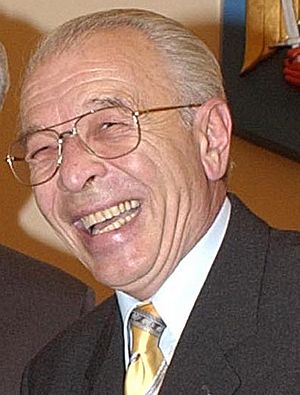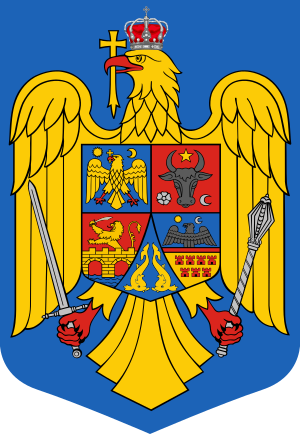Nicolae Văcăroiu facts for kids
Quick facts for kids
Nicolae Văcăroiu
|
|
|---|---|

Văcăroiu in 2004
|
|
| Acting President of Romania | |
| In office 20 April 2007 – 23 May 2007 |
|
| Prime Minister | Călin Popescu-Tăriceanu |
| Preceded by | Traian Băsescu |
| Succeeded by | Traian Băsescu |
| Prime Minister of Romania | |
| In office 18 November 1992 – 12 December 1996 |
|
| President | Ion Iliescu Emil Constantinescu |
| Preceded by | Theodor Stolojan |
| Succeeded by | Victor Ciorbea |
| President of the Senate of Romania | |
| In office 20 December 2000 – 14 October 2008 |
|
| Preceded by | Mircea Ionescu-Quintus |
| Succeeded by | Doru Ioan Tărăcilă (Acting) |
| President of the Romanian Court of Auditors | |
| In office 14 October 2008 – 14 October 2017 |
|
| Preceded by | Dan Drosu Șaguna |
| Succeeded by | Mihai Busuioc |
| Member of the Senate of Romania | |
| In office 22 November 1996 – 20 October 2008 |
|
| Constituency | Argeș County |
| Personal details | |
| Born | 5 December 1943 Cetatea Albă, Kingdom of Romania (now Bilhorod-Dnistrovskyi, Odesa Oblast, Ukraine) |
| Political party | Romanian Communist Party (before 1989) National Salvation Front (1989–1992) Democratic National Salvation Front (1992–1993) Party of Social Democracy in Romania (1993–2001) Social Democratic Party (2001–present) |
| Profession | Economist |
| Signature | |
| a. During the first impeachment trial of President Traian Băsescu in 2007. | |
Nicolae Văcăroiu (born 5 December 1943) is a Romanian politician. He was a member of the Social Democratic Party (PSD). He served as the Prime Minister from 1992 to 1996. Before the 1989 Revolution, he worked for the government's planning committee. He was also the President of the Senate of Romania for nearly eight years.
Political Career
Becoming Prime Minister
On November 20, 1992, Nicolae Văcăroiu became the Prime Minister of Romania. His time as Prime Minister started with some changes to the country's economy. These changes helped Romania's economy start growing again in 1993.
Economic Growth and Challenges
Between 1993 and 1996, Romania's GDP (which measures the total value of goods and services produced) grew by 17.5%. This was a big improvement after the economy had shrunk a lot right after the fall of the communist government. Industrial production also increased by 22% during this time.
However, this growth was not always strong. Many state-owned businesses were not managed well. There was also very little foreign investment because the government did not want to sell off many industries. These delays caused Romania to face economic difficulties again later.
Văcăroiu's government tried a different way to privatize (sell off) state-owned companies. They gave parts of these companies to the general public. However, people did not get much information about how these companies were doing. By the end of his term, many state-owned businesses were in trouble.
International Relations
During his time as Prime Minister, Romania worked towards joining the European Union (EU) and NATO.
- In 1993, Romania signed an agreement with the European Community.
- In 1995, Romania officially asked to join the European Union.
- Romania also made its first request to join NATO.
Relations with neighboring countries were sometimes difficult. For example, Moldova and Ukraine had concerns about Romania's past claims on their land. However, these tensions lessened after visits by Văcăroiu and other officials in 1995. A treaty with Hungary was signed in 1996, and with Yugoslavia in 1996 after a peace agreement.
| Presidential styles of Nicolae Văcăroiu |
|
|---|---|
 |
|
| Reference style | Președintele (President) |
| Spoken style | Președintele (President) |
| Alternative style | Domnia Sa/Excelența Sa (His Excellency) |
Acting President
In 2007, the President of Romania, Traian Băsescu, was temporarily suspended by the Parliament. Nicolae Văcăroiu became the acting president from April 20 to May 23, 2007. During this time, he had most of the powers of a president, but he could not dissolve the Parliament, speak to the Parliament, or organize a public vote.
President of the Court of Audit
On October 14, 2008, the Parliament voted for him to become the President of the Court of Audit. He held this important position until October 14, 2017. The Court of Audit checks how the government spends public money.
Professional Life
Early Career
Nicolae Văcăroiu studied economics at the Bucharest Academy of Economic Studies. After graduating in 1969, he started working at the State Planning Committee. He moved up through different roles, eventually becoming the director of the Finance Department. He helped manage financial activities and prepare reports on state-owned businesses.
Later, he became a Deputy Minister in the National Ministry of Economy. He also served as State Secretary within the Ministry of Finance. In this role, he helped create a plan for gradually making prices free in the Romanian economy. He also worked on tax reforms to match European Union laws, like introducing the Value Added Tax (VAT).
Achievements as Prime Minister (1993–1996)
As Prime Minister, Văcăroiu focused on helping Romania's economy recover.
- Economic Growth: Romania's GDP increased by 17.4%. Industrial production also grew by 21.7%.
- Trade and Investment: Exports increased from $3.4 billion in 1992 to $6.5 billion in 1996. Investments also grew.
- Government Spending: The government's budget deficit (when spending is more than income) was reduced.
- Controlling Prices: His government removed many price controls and subsidies (government support) in 1993. This led to a temporary rise in inflation, but it helped stabilize the economy.
- Tax Changes: The Value Added Tax (VAT) was introduced in 1993. Taxes on company profits were also reduced to encourage businesses.
- Support for Businesses: The government provided loans and support for small and medium-sized businesses. By the end of 1996, there were over 526,000 private companies.
- Salaries and Pensions: To help people with rising prices, salaries, pensions, and social benefits were increased. A minimum wage was also introduced.
- Privatization: The government worked on selling state-owned companies to private owners. Over 2,700 companies were privatized between 1993 and 1996. By 1996, the private sector made up 54.9% of Romania's GDP.
- Modernizing Infrastructure: Investments were made in industries, communications, and roads. For example, over 1,000 km of national roads were improved.
International Economic Relations
During his term, Romania also made progress in its international economic standing:
- In 1995, international rating agencies gave Romania a good credit rating, similar to Poland and Hungary.
- Romania was able to get loans from international organizations like the International Monetary Fund (IMF) and the World Bank. These loans, totaling about $12 billion, were mostly used for investments.
- The country's foreign currency reserves increased significantly.
Later Roles
After being Prime Minister, Văcăroiu held several other important positions:
- He was the Vice President of the Romanian Commercial Bank (1996-1998).
- He served as President of the Investment and Development Bank (1998-2000).
- He was a Senator for Argeș County (1996-2008).
- He became the President of the Senate of Romania for two terms (2000-2008). In this role, he worked to improve law-making and strengthen relations with other countries' parliaments. He also led the Parliamentary Assembly of the Black Sea Economic Cooperation.
- From 2008 to 2017, he was the President of the Court of Accounts of Romania. During his time, the Court celebrated its 150th anniversary in 2014.
Teaching and Publications
Between 1975 and 1984, Nicolae Văcăroiu was a professor at the Bucharest Academy of Economic Studies and the University of Bucharest. He also worked as a researcher at the Central Institute for Economic Research. He wrote many articles on economic and financial topics. He also co-authored a book called "Romania, Games of Interest" in 1998.
Awards and Honors
Nicolae Văcăroiu has received many awards and honors throughout his career, both in Romania and from other countries.
Romanian Awards
- He received the Order of the Star of Romania, one of the highest honors in the country, at both Officer and Knight ranks.
- He was awarded the "University Merit with Virgil Madgearu Gold Medal" by the Bucharest Academy of Economic Studies.
- He received honorary doctorates and degrees from several universities, including Andrei Șaguna University and the University of Pitești.
- He was recognized by various professional organizations for his contributions to the Romanian economy.
- He received over 120 excellence or honor degrees from public institutions and associations.
- He was named an "Honorary Citizen" by many cities and counties, including Pitești and Argeș County.
International Awards
- He received the National Order of Merit, Grand Cross, from the President of Paraguay.
- He was awarded "The Renaissance Order, First Order" by the King of Jordan.
- He received the "Gold Medal Pericles" from the President of the Hellenic Parliament.
- He was given the "Gold Medal of the French Senate" and the "Grand Decoration" from the Senate of Chile.
- He also received awards from the Czech Republic, Brazil, and Bulgaria for his support in European integration.
See also
 In Spanish: Nicolae Văcăroiu para niños
In Spanish: Nicolae Văcăroiu para niños
 | Claudette Colvin |
 | Myrlie Evers-Williams |
 | Alberta Odell Jones |

